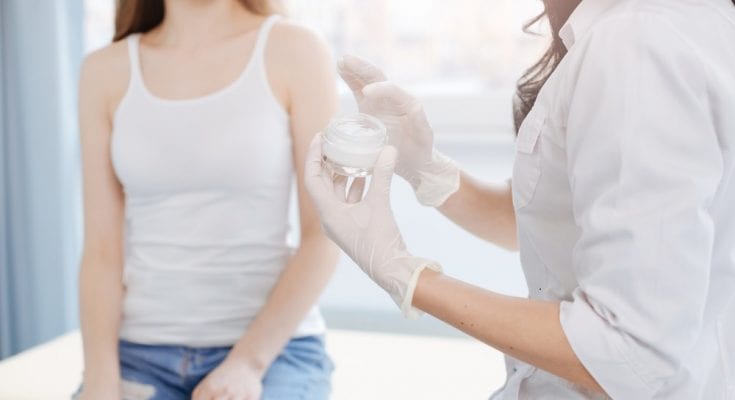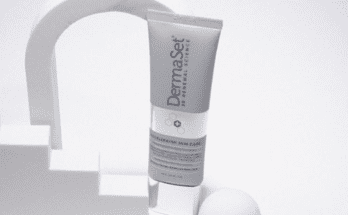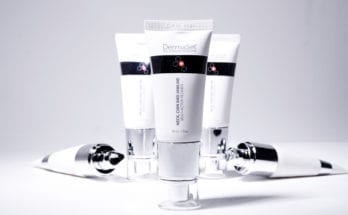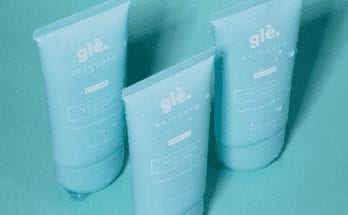We all like to save money. We often apply this thrifty behavior when it comes to our skincare products. Why buy an expensive eye cream when there’s a dupe that works just as good from the drugstore…or does it?
We spoke to aesthetician Brittany Del Toro to explain the differences between drugstore products and medical grade products.
What are Medical Grade Products?
Before speaking to Brittany, I had no idea what medical grade skincare was, or that it even existed (yikes!). This is probably because you can only purchase them from a dermatology office or a medical spa. If you don’t frequent these places often, or at all, you may be in the dark, too.
“So medical grade skincare products can only be purchased through a medical spa or a dermatology office. And the active ingredients are at a much higher percentage and go to a deeper depth of the skin,” says Del Toro. “So for someone wanting to treat a skin condition like acne or discoloration, they get actual results! Medical grade products also go through thorough clinical research and have many statistics shown to back up the science behind the products.”
Medical grade products are much more expensive than drugstore products. However the ingredients are stronger and absorb deep into the skin. So in the end, you get the results you want. With drugstore products, there’s a 50/50 chance of the product working. At least that’s the case for this skincare blogger.
Drugstore Skincare Products
I read an insightful article that said drugstore products sometimes spend more money on advertising than on product research. However, medical grade products have been, according to Del Toro, “thoroughly researched and tested.” And then there are the ingredients…
“(Drug store products) are more “inferior”, I think, just for the fact that the active ingredients…usually contain many fillers, fragrances, and preservatives, making it more common for the skin to get irritated and unbalanced,” explains Del Toro. “Another thing with drugstore products is that they only work on the outermost layer of the skin, so you don’t see long term changes for those who have skin conditions.”
Does this mean we should stop going to convenience stores like Walgreen’s and CVS? Or do any of their skincare products work?
“If you are really wanting to see a change in your skin,” says Del Toro, “shopping at places like Walgreen’s and CVS for skincare will not do it for you. Asking an aesthetician what kind of drugstore skincare they should buy is like asking a 5 star chef what can of Chef Boyardee is the best!”
Ouch.
Drugstore Products to Absolutely Avoid
I wanted to know if there were drugstore products that we should stay away from, because I’m not sure that this knowledge will stop everyone from buying products from CVS or Walgreen’s. But at the very least, you can learn what to absolutely avoid.
“Stay far away from apricot scrubs and other exfoliating scrubs, facial cleansers and retinol products,” cautions Del Toro. “Most over the counter exfoliator scrubs contain hard beads that do not break down and can cause irritation in the skin and even microscopic abrasions.”
It’s very surprising that facial cleansers fall into this category, as my number one cleanser is Cetaphil…which I buy from Walgreen’s.
“Cleansers over the counter usually contain many fragrances and preservatives, as well as the pH not being properly balanced, making your skin more compromised and the barrier weakened,” Del Toro says. “Retinol may not be as strong, making it not as effective as using a medical grade retinol product.”
Some non-Medical Grade Products are OK
On the plus side, Del Toro doesn’t disapprove of all non medical grade products. There are brands that stand tall among the rest – these appear to be high-end brands. Just so you know, medical grade and high-end products are not the same. According to Del Toro, medical grade is in a category of its own. Don’t let the the price from a high-end product fool you. It may not be clinically tested.
“I will say that there are some skincare lines that I do like from Sephora, like Herbivore Botanicals, Drunk Elephant and Tatcha,” says Del Toro, “but I can’t say that I would suggest those over medical grade products for a full skincare regimen.”
There are many natural, organic brands that are paraben and fragrance-free, which Del Toro leans toward.
“There is a toner that I have been using for years that I actually do buy over the counter, because it’s all natural and doesn’t contain alcohol or harsh ingredients,” she says. “It actually really helps my skin.”
Since we’re on the subject of natural, safe products, we personally suggest that people avoid large companies. They typically add preservatives to increase their product’s shelf life, as well as parabens, fragrances, etc. Instead, choose small brands that produce small batch products, such as Petal Fresh. Their ingredients are natural and often organic.
“Most small natural brands will have fragrance free and cruelty free products, which I really support, and will be more gentle on the skin,” says Del Toro. “In fact, I use many products in between my medical grade lines that are natural and use essential oils. And they are a great addition into my regimen.”
If you need more incentive to buy natural, non GMO brands that are cruelty-free, we’ve just provided one more.
Brittany Del Toro
Brittany Del Toro is a Medical Aesthetician located in Scottsdale, Arizona. She specializes in Acne and Anti-aging treatments as well as medical skincare treatments such as chemical peels, microneedling, Dermalinfusion, and dermaplaning. She is a beauty and skincare guru and influencer on Instagram, and has a large following supporting and engaging in her top of the line, up to date skincare tips and treatments. Brittany is well known for keeping clients and followers educated on proper skincare, and has many charts and skin tips made to share with everyone! Brittany is also a mom to 4 boys and has been married for over 6 years. When not doing skincare, she loves to craft, teach dance, and spend time with her sweet family.




